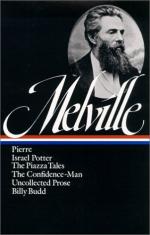The revenue vessel resumed her course towards the nighest port, worked by but four men: the captain, Israel, and two officers. The cabin-boy was kept at the helm. As the only foremast man, Israel was put to it pretty hard. Where there is but one man to three masters, woe betide that lonely slave. Besides, it was of itself severe work enough to manage the vessel thus short of hands. But to make matters still worse, the captain and his officers were ugly-tempered fellows. The one kicked, and the others cuffed Israel. Whereupon, not sugared with his recent experiences, and maddened by his present hap, Israel seeing himself alone at sea, with only three men, instead of a thousand, to contend against, plucked up a heart, knocked the captain into the lee scuppers, and in his fury was about tumbling the first-officer, a small wash of a fellow, plump overboard, when the captain, jumping to his feet, seized him by his long yellow hair, vowing he would slaughter him. Meanwhile the cutter flew foaming through the channel, as if in demoniac glee at this uproar on her imperilled deck. While the consternation was at its height, a dark body suddenly loomed at a moderate distance into view, shooting right athwart the stern of the cutter. The next moment a shot struck the water within a boat’s length.
“Heave to, and send a boat on board!” roared a voice almost as loud as the cannon.
“That’s a war-ship,” cried the captain of the revenue vessel, in alarm; “but she ain’t a countryman.”
Meantime the officers and Israel stopped the cutter’s way.
“Send a boat on board, or I’ll sink you,” again came roaring from the stranger, followed by another shot, striking the water still nearer the cutter.
“For God’s sake, don’t cannonade us. I haven’t got the crew to man a boat,” replied the captain of the cutter. “Who are you?”
“Wait till I send a boat to you for that,” replied the stranger.
“She’s an enemy of some sort, that’s plain,” said the Englishman now to his officers; “we ain’t at open war with France; she’s some bloodthirsty pirate or other. What d’ye say, men?” turning to his officers; “let’s outsail her, or be shot to chips. We can beat her at sailing, I know.”
With that, nothing doubting that his counsel would be heartily responded to, he ran to the braces to get the cutter before the wind, followed by one officer, while the other, for a useless bravado, hoisted the colors at the stern.
But Israel stood indifferent, or rather all in a fever of conflicting emotions. He thought he recognized the voice from the strange vessel.
“Come, what do ye standing there, fool? Spring to the ropes here!” cried the furious captain.
But Israel did not stir.
Meantime the confusion on board the stranger, owing to the hurried lowering of her boat, with the cloudiness of the sky darkening the misty sea, united to conceal the bold manoeuvre of the cutter. She had almost gained full headway ere an oblique shot, directed by mere chance, struck her stern, tearing the upcurved head of the tiller in the hands of the cabin-boy, and killing him with the splinters. Running to the stump, the captain huzzaed, and steered the reeling ship on. Forced now to hoist back the boat ere giving chase, the stranger was dropped rapidly astern.




